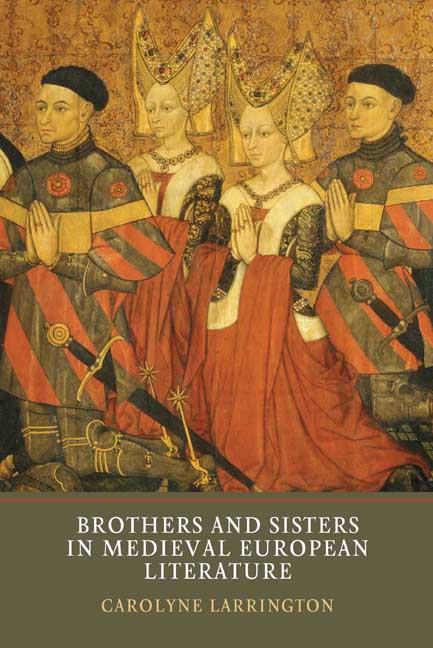Book contents
- Frontmatter
- Dedication
- Contents
- Acknowledgements
- Abbreviations
- Introduction
- 1 The Medieval Sibling in History
- 2 ‘Berr er hverr á bakinu nema sér bróður eigi’: Fraternal Love and Loyalty
- 3 ‘Io v’ho cara quanto sorella si dee avere’: Sisters, and their Brothers
- 4 ‘Næs þæt andæges nið’: Fraternal Hatreds
- 5 ‘Te souviegne de ce que je suis ta seur’: Sisters and Hostility
- 6 ‘The king’s dochter gaes wi child to her brither’: Sibling Incest
- 7 ‘So wil ich dir ce wibe mine swester gebn’: When Siblings Marry
- 8 ‘Trewethes togider that gun plight’: Fictive Siblings
- Conclusion
- Bibliography
- Index
4 - ‘Næs þæt andæges nið’: Fraternal Hatreds
Published online by Cambridge University Press: 08 May 2021
- Frontmatter
- Dedication
- Contents
- Acknowledgements
- Abbreviations
- Introduction
- 1 The Medieval Sibling in History
- 2 ‘Berr er hverr á bakinu nema sér bróður eigi’: Fraternal Love and Loyalty
- 3 ‘Io v’ho cara quanto sorella si dee avere’: Sisters, and their Brothers
- 4 ‘Næs þæt andæges nið’: Fraternal Hatreds
- 5 ‘Te souviegne de ce que je suis ta seur’: Sisters and Hostility
- 6 ‘The king’s dochter gaes wi child to her brither’: Sibling Incest
- 7 ‘So wil ich dir ce wibe mine swester gebn’: When Siblings Marry
- 8 ‘Trewethes togider that gun plight’: Fictive Siblings
- Conclusion
- Bibliography
- Index
Summary
Introduction
For medieval Christians, human history began with a fraternal killing. After Cain ‘slog his broðor swæsne’ (‘struck his dear brother’), and the earth swallowed Abel's blood, ‘bealoblonden niþ’ (‘hostility mixed with evil’), as the Old English Exeter Maxims note, became widespread amongst mankind. Fratricide and the impulses which underlie it can never be eliminated, for fear of replacement by the brother, that one who is the same as you, that one who can take your place, is deeply embedded in the psyche. ‘Because each sibling evokes the danger of the other's annihilation, siblings are going to want to kill each other. This murderousness is forbidden, and must be transmuted to aggressive play and healthy rivalry’, suggests Juliet Mitchell. Where sibling trauma – the fear of substitution or of failing to differentiate – is successfully processed, love, respect, self-esteem and strong loyalties result. On a social level, as well as in the individual psyche, repeated cultural work is required to uncover and resolve the dark urge to destroy the sibling. The brother comes to be perceived as a ‘monstrous double’ in Girard's terms: one whose existence menaces his brother, but also one who threatens larger social structures, whose desires distort and threaten the cultural order. Mythology perpetually returns to the fratricidal theme; foundation tales recognize how the sacrifice of the brother inaugurates the beginning of a new kind of order. As chapter two's discussion of accidental fratricide showed, brother-killing is a recurrent locus of horror that signifies powerfully in medieval narrative. Brothers slay one another over inheritances, kingdoms and women. Often, however, the trigger for the killing is a comparatively trivial matter, but one which nevertheless strikes to the heart of fraternal fears of displacement and loss of identity. ‘Pathologies of the borderline’ – apparently minor infringements of previously negotiated distinctions – provoke a sibling fury that astonishes by its violence.
Cain and Abel, and their Reflexes
The story of Cain and Abel, the ur-feud for Old English poets, resonates through the medieval imagination. Cain's quarrel with Abel challenges the premise that brothers prosper in adult life when they choose separate paths: when they establish differentiation and agree to minimize the arena for competition and direct comparison.
- Type
- Chapter
- Information
- Brothers and Sisters in Medieval European Literature , pp. 104 - 128Publisher: Boydell & BrewerPrint publication year: 2015



